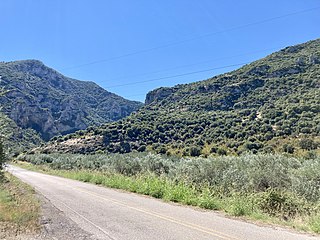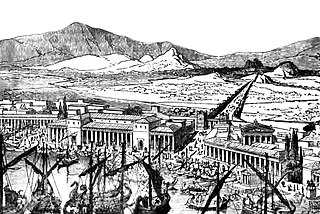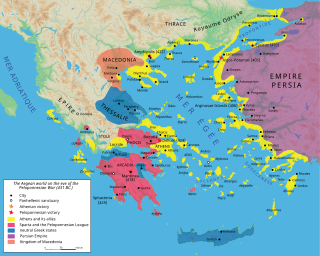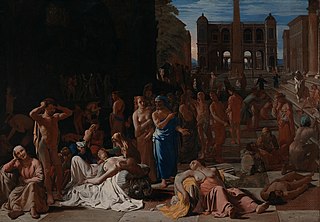 W
WThe Peloponnesian War was an ancient Greek war fought by the Delian League led by Athens against the Peloponnesian League led by Sparta. Historians have traditionally divided the war into three phases. In the first phase, the Archidamian War, Sparta launched repeated invasions of Attica, while Athens took advantage of its naval supremacy to raid the coast of the Peloponnese and attempt to suppress signs of unrest in its empire. This period of the war was concluded in 421 BC, with the signing of the Peace of Nicias. That treaty, however, was soon undermined by renewed fighting in the Peloponnese. In 415 BC, Athens dispatched a massive expeditionary force to attack Syracuse, Sicily; the attack failed disastrously, with the destruction of the entire force in 413 BC. This ushered in the final phase of the war, generally referred to either as the Decelean War, or the Ionian War. In this phase, Sparta, now receiving support from the Achaemenid Empire, supported rebellions in Athens's subject states in the Aegean Sea and Ionia, undermining Athens's empire, and, eventually, depriving the city of naval supremacy. The destruction of Athens's fleet in the Battle of Aegospotami effectively ended the war, and Athens surrendered in the following year. Corinth and Thebes demanded that Athens should be destroyed and all its citizens should be enslaved, but Sparta refused.
 W
WAndromache is an Athenian tragedy by Euripides. It dramatises Andromache's life as a slave, years after the events of the Trojan War, and her conflict with her master's new wife, Hermione. The date of its first performance is unknown. Some scholars place the date sometime between 428 and 425 BC. Müller places it between 420 and 417 BC. A Byzantine scholion to the play suggests that its first production was staged outside Athens, though modern scholarship regards this claim as dubious.
 W
WAtalanti or Atalantonisi (Αταλαντονήσι) or Talandonísi (Ταλαντονήσι) is a small uninhabited island in the North Euboean Gulf, about 600 m off the coast near the town Atalanti, Phthiotis, Greece. There are several small islets next to Atalanti island, including the islet of Agios Nikolaos.
 W
WThe Battle of Lyncestis/Lyncus took place in 423 BC between the allied forces of the Lyncestians and Illyrians against those of the Spartans and Macedonians. The battle was part of the wider Peloponnesian Wars. Before Athens suffered defeat at Delium in 424 BC, Sparta had sent an expedition under Brasidas to assist Perdiccas II of Macedonia and other opponents of Athens. At first Sparta avoided involvement in Macedon's war with Arrhabaeus, but in 423 BC they joined an expedition which ended with retreat by the Macedonians and a brilliantly contrived escape of the Spartans.
 W
WHeraclea (Herakleia) in Trachis, also called Heraclea Trachinia, was a colony founded by the Spartans in 426 BC, the sixth year of the Peloponnesian War. It was also a polis (city-state).
 W
WThe History of the Peloponnesian War is a historical account of the Peloponnesian War, which was fought between the Peloponnesian League and the Delian League. It was written by Thucydides, an Athenian historian who also served as an Athenian general during the war. His account of the conflict is widely considered to be a classic and regarded as one of the earliest scholarly works of history. The History is divided into eight books.
 W
WAlthough long walls were built at several locations in ancient Greece, notably Corinth and Megara, the term Long Walls generally refers to the walls that connected Athens main city to its ports at Piraeus and Phaleron. Built in several phases, they provided a secure connection to the sea even during times of siege. The walls were about 6 km in length, initially constructed in the mid 5th century BC, destroyed by the Spartans in 403 BC after Athens' defeat in the Peloponnesian War, and rebuilt again with Persian support during the Corinthian War in 395-391 BC. The Long Walls were a key element of Athenian military strategy, since they provided the city with a constant link to the sea and thwarted sieges conducted by land alone.
 W
WThe members of the Delian League/Athenian Empire can be categorized into two groups: the allied states (symmachoi) reported in the stone tablets of the Athenian tribute lists, who contributed the symmachikos phoros in money, and further allies, reported either in epigraphy or historiography, whose contribution consisted of ships, wood, grain, and military assistance; proper and occasional members, subject members and genuine allies.
 W
WThe Mytilenian Debate in the Athenian Assembly concerned reprisals against the city-state of Mytilene, which had attempted unsuccessfully to shake off Athenian hegemony, during the Peloponnesian War. The Debate occurred in 427 B.C.; Thucydides reports it in book three of his History of the Peloponnesian War, and uses the events and the speeches as a major opportunity to reflect and to offer his views on the political and ideological impact of the war on the parties involved.
 W
WOzolian Locris or Hesperian Locris was a region in Ancient Greece, inhabited by the Ozolian Locrians a tribe of the Locrians, upon the Corinthian Gulf, bounded on the north by Doris, on the east by Phocis, and on the west by Aetolia.
 W
WPeace is an Athenian Old Comedy written and produced by the Greek playwright Aristophanes. It won second prize at the City Dionysia where it was staged just a few days before the Peace of Nicias was validated, which promised to end the ten-year-old Peloponnesian War. The play is notable for its joyous anticipation of peace and for its celebration of a return to an idyllic life in the countryside. However, it also sounds a note of caution, there is bitterness in the memory of lost opportunities and the ending is not happy for everyone. As in all of Aristophanes' plays, the jokes are numerous, the action is wildly absurd and the satire is savage. Cleon, the pro-war populist leader of Athens, is once again a target for the author's wit, even though he had died in battle just a few months earlier.
 W
WThe Peloponnesian League was an alliance in the Peloponnesus from the 6th to the 4th centuries BC, dominated by Sparta. It is known mainly for being one of the two rivals in the Peloponnesian War, against the Delian League, which was dominated by Athens.
 W
WPericles' Funeral Oration is a famous speech from Thucydides' History of the Peloponnesian War. The speech was delivered by Pericles, an eminent Athenian politician, at the end of the first year of the Peloponnesian War as a part of the annual public funeral for the war dead.
 W
WThe Plague of Athens was an epidemic that devastated the city-state of Athens in ancient Greece during the second year of the Peloponnesian War when an Athenian victory still seemed within reach. The plague killed an estimated 75,000 to 100,000 people, around one quarter of the population, and is believed to have entered Athens through Piraeus, the city's port and sole source of food and supplies. Much of the eastern Mediterranean also saw an outbreak of the disease, albeit with less impact.
 W
WTides of War is a 2000 novel by Steven Pressfield, chronicling the Peloponnesian War.